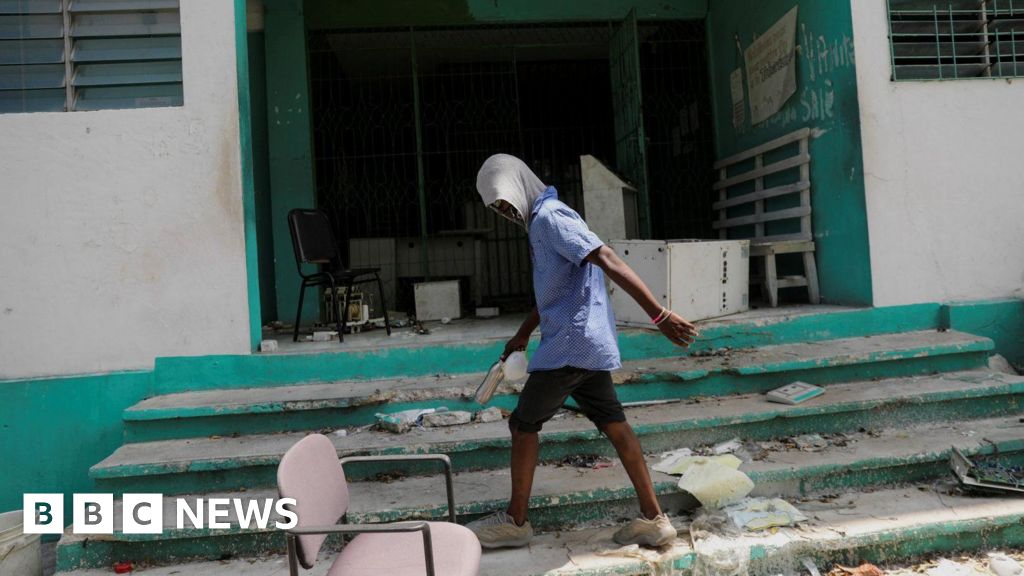UNICEF has warned that Haiti’s health system is “on the verge of collapse”, saying six out of 10 hospitals in the country are barely functioning.
“The combination of violence, mass displacement, dangerous epidemics and rising malnutrition has overwhelmed Haiti’s health system,” said Bruno Metz, UNICEF Country Representative in the Caribbean.
But he stressed that “the strangulation of supply chains may be the cause of its disruption”.
Armed groups still control much of the capital, Port-au-Prince, and Unicef says millions of children are at risk of disease and malnutrition.
The country has been plunged into deep instability since the assassination of President Jovenel Moise in 2021, during which gangs have increasingly taken control of large swaths of the country.
Overall, up to 4.4 million people in the country are in urgent need of food assistance and 1.6 million “face severe food insecurity emergencies, which increases the risk of wasting and malnutrition among children,” UNICEF said.
Port-au-Prince International Airport reopened earlier this week after being closed for nearly three months.
But UNICEF said the agency is currently operating at limited capacity and has a huge backlog.
The U.N. agency said the situation in the capital was particularly dire. Containers full of vital supplies were hijacked or looted, as were many warehouses and pharmacies.
Reginald Fils-Aimé, director of strategic planning at the Haiti-based NGO Zanmi Lasante, told the BBC that by “controlling the roads in and out of the capital, criminal gangs severely affect supply chains and all traffic, including that of health care workers and patients.”
Dr. Fils-Aimé said criminal armed groups also control several large areas in the central Artibonite department, where his NGO has been operating since the 1980s.
“Many essential medicines have been in short supply because most of them come from abroad. Recently, there have been shortages of intravenous fluids, diuretics, blood pressure medications and beta-blockers.
“Children and infants living in IDP camps are particularly vulnerable to unhygienic conditions and the water-borne diseases they spread. Now that the rainy season has begun, they are also vulnerable to vector-borne diseases such as malaria,” Phil Dr. S-Aime added.
Nadesh Mijoba, country director of the Haitian Health Foundation (HHF), told the BBC that “health services that were once available to the community have been shut down in many areas due to attacks and even damage to infrastructure”.
“As with other facilities, such as HHF, our patient volumes are increasing significantly as patients need to walk greater distances to seek care and are often at high risk of violence, kidnapping, rape or even murder.
“I have lived and worked in Haiti for more than 11 years and I have never seen such a catastrophic humanitarian situation,” Ms. Michoba said.
Kenya will send police to Haiti, leading an international task force, to try to help the country’s transitional council restore a degree of stability.
The country’s leader William Ruto met US President Joe Biden at the White House on Wednesday to discuss the operation.
Dr. Fiers-Aimé said he hoped Haiti’s main seaports and roads would “be open to traffic in the coming months.”
Zanmi Lasante’s Boston-based sister organization, Partners In Health, has been pushing for the creation of humanitarian corridors to ensure the movement of emergency critical aid around Haiti.
The gang has been carrying out deadly coordinated attacks calling for the resignation of then-prime minister Ariel Henry.
He agreed to resign in March. Nine members of the transitional council have now been sworn in to lead the country.
But the gangs took advantage of the power vacuum left by Henry’s exit to expand their control over large swathes of the country, which had become effectively lawless.

